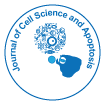Curcumin Induces Lung Cancer A549 Cells Apoptosis through Endoplasmic Reticulum Stress Pathway
*Corresponding Author: Rui-Cheng Hu, Department of Respiratory Medicine, Hunan Provincial People’s Hospital/The First Affiliated Hospital of Hunan Normal University, Changsha, Hunan Province, China, Tel: +86-731-84762679, Fax: +86-731-84762680, Email: huruicheng@hotmail.comReceived Date: Dec 26, 2018 / Accepted Date: Jan 10, 2019 / Published Date: Jan 20, 2019
Citation: Wang LL, Hu RC, Tan SX, Xu M (2019) Curcumin Induces Lung Cancer A549 Cells Apoptosis through Endoplasmic Reticulum Stress Pathway. J Cell Sci Apo 2:111.
Copyright: © 2019 Wang LL, et al. This is an open-access article distributed under the terms of the Creative Commons Attribution License, which permits unrestricted use, distribution, and reproduction in any medium, provided the original author and source are credited.
Abstract
Aims: The effects of curcumin on proliferation and apoptosis of lung cancer A549 cells were detected, and the role of endoplasmic reticulum stress reaction was further explored.
Methods: Lung cancer A549 cells were treated with curcumin from different concentrations (2.5 μM, 5 μM, 10 μM, 20 μM, 50 μM), MTT assay detected the impact of curcumin on cell proliferation and flow cytometry determined the effect of curcumin on A549 cells apoptosis. Western blotting detected the changing expression of the target gene on protein level.
Results: Compared with the control group, each group of curcumin (2.5 μM, 5 μM, 10 μM, 20 μM, 50 μM) inhibited the proliferation of A549 cells, and the inhibition of proliferation was more significant with the increase of the time (p<0.05). Curcumin can induce apoptosis of A549 cells, compared with the control group (p<0.05), showing a dose-dependent relationship. In terms of the protein level, curcumin can induce the expression of activating transcription factor 6 (ATF6) (p<0.05), caspase-4(p<0.05) and C/EBP-homologous protein (CHOP) (p<0.01) in A549 cells, and its expression is dose dependent.
Conclusion: Curcumin can induce apoptosis in lung cancer A549 cells through endoplasmic reticulum stress pathway.
